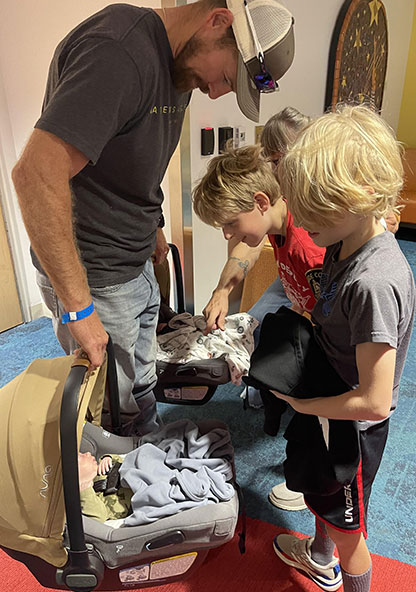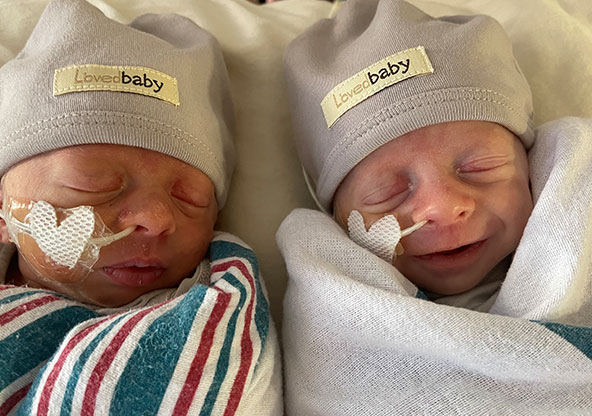Tiny Titans: An Inspiring Journey of Twins who Beat the Odds
Parenthood often throws unexpected curveballs, and Mary Roberts' story is no exception. When she first learned she was pregnant, she had envisioned a natural birthing experience at a birthing center. As Mary explains, “God had other plans.” Her plans took a sharp turn when she discovered she was carrying twins during her 20-week ultrasound. Recognizing the increased risks, Mary and her husband decided to opt for the safety of delivery their twins at CHRISTUS Children’s.
As Mary's pregnancy progressed, doctors closely monitored her due to the twins' unique condition. Not only were they identical, but they also shared the same placenta while having separate amniotic sacs, a rare occurrence known as Monochorionic diamniotic twins. Regular ultrasounds revealed an alarming condition called TAPS, or twin anemia polycythemia sequence, where blood was unevenly distributed between the twins, with one receiving too much and the other too little. “This caused a problem for each of the twins,” said Mary. Jud was considered the ‘recipient,’ getting too many red blood cells. Jed, the ‘donor,’ was receiving far too few.
To cope with her anxiety, Mary joined online support groups, but the shared stories only heightened her worry. “It was extremely exhausting living in this heightened state of stress. You see everybody’s stories and you’re just worried about everything happening,” she said.
At 32 weeks, doctors decided it was time to deliver the twins due to the increasing stress on both infants. The birth occurred on Aug. 28, 2023, coincidentally on Mary's birthday, and the couple chose a C-section to ensure the twins' well-being. Dr. Lea Porche, a maternal fetal medicine doctor at CHRISTUS Children’s began planning for one of the greatest birthday gifts Mary would ever receive.
The twins, Jed and Jud, were born at 10:02 and 10:04 p.m., each weighing 4 pounds, 8 ounces. “It was scary because they were so little,” Mary said. Although their small size initially raised concerns, neither required intubation, and Jud received a saline transfusion to thin out his blood. Jed, thankfully, ended up not needing a blood transfusion.
“Having two babies in the NICU was extremely difficult,” said Mary. “It felt like we had more of a chance of something bad happening.” The subsequent weeks were challenging as Mary and her husband navigated the NICU's demands and uncertainties. They diligently documented every detail and attended shift changes and doctor's rounds to stay informed.
Initially, the twins were placed in different pods in the NICU. This separation was emotionally taxing for the parents. However, they were eventually moved next to each other, easing their ability to spend time with both infants.
Milestones like the first time Mary held each of her sons and the moment she held them together were deeply cherished. "Kangaroo care," or skin-to-skin contact, was a precious bonding experience encouraged by the nurses. “It was such a process to get everything done for me to do ‘kangaroo care’ but the nurses were so accommodating and encouraged it no matter when I wanted to do it,” she said.
Over time, they transitioned from CPAP bubble support to nasal cannulas for respiratory support and weaned from IV nutrition to receiving all their nutrition in their stomach. There were many discussions revolving around feeding techniques, bowel movements and breastfeeding. There were setbacks, such as gastric reflux, prompting adjustments to their feeding regimen.
Each day brought anticipation as the Roberts family eagerly awaited signs of weight gain, a crucial indicator of the twins' improving health. The five-day test, where the twins had to finish 80% of every bottle without experiencing bradycardia, was a pivotal moment.
“I felt split between two lives,” said Mary. “Our 8- and 10-year-old boys at home, and the twins in the hospital. I wanted to be with everyone but felt like I could not leave our newborns.” They spent 40 days in the NICU. The desire to be with both was overwhelming, making her time in the NICU emotionally challenging.
After 40 days on October 8, the Roberts family received the long-awaited news: Jed and Jud were ready to go home, bringing immense relief. "It was just pure relief. I felt so relieved to be out of the hospital," Mary said.
Now, the Roberts family is adjusting to their "new normal," cherishing every moment with their healthy, thriving twins – the latest additions to their family of six.
To learn more about the neonatal intensive care unit (NICU) at CHRISTUS Children’s, please visit CHRISTUS Children’s | NICU (christushealth.org).

What is TAPS?
TAPS, short for Twin Anemia Polycythemia Sequence, is a rare condition affecting twins, particularly those who are monochorionic, meaning they share the same placenta. TAPS causes an unequal exchange of blood between twins through tiny blood vessels in the shared placenta. This leads to one twin (the donor) developing anemia (low red blood cell count), while the other twin (the recipient) develops polycythemia (high red blood cell count).
This imbalance can cause complications for both twins. The donor twin may suffer from a lack of oxygen and nutrients due to anemia, while the recipient twin may have higher a volume of blood, putting them both at risk for issues like heart failure.
TAPS can be challenging to diagnose before birth and is often detected through specialized ultrasound techniques. Management and treatment of TAPS depend on the severity of the condition and may include close monitoring, early delivery, and postnatal interventions to address the blood imbalance.


